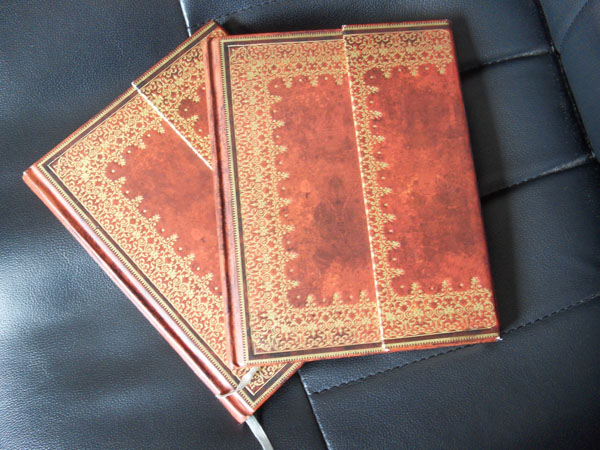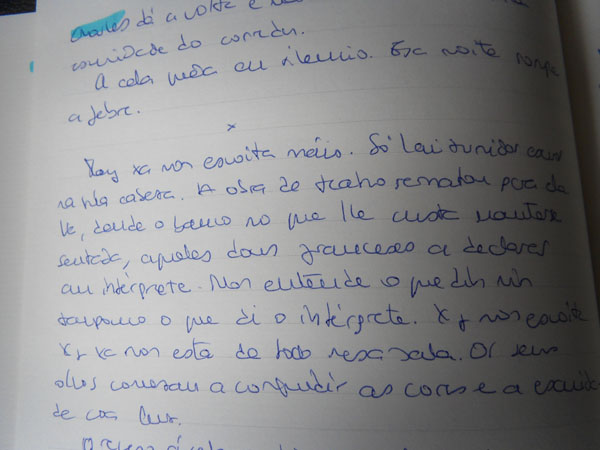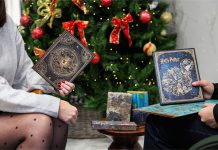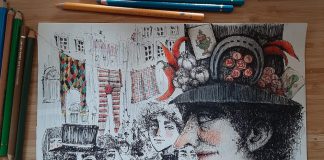
- Name: María Reimóndez
- Age: 36
- City/Town: Vigo
- Country: Galicia, Spain
- Places Travelled & Place lived: Places I feel a special connection to, either because I have lived there for a long time or for other reasons are: Tamil Nadu, India; Bavaria, Germany and Scotland and Wales, UK.
- Loves: I love languages in general and my mother tongue, Galician, in particular; books, courageous women, and dogs
- Teachers/Education: I have a degree in translation and interpreting
- Occupation: Interpreter and writer
- Creative Works: I write for adults and for children. The list of my works and some samples of my work in English can be found on my website.
- Quote: “One hand alone cannot make music.” – It is a wonderful Tamil saying about the need for people to work together.
What would one find in the pages of your Paperblanks journal?
My writing. I always write my novels on paper first before correcting and re-correcting them many times on the computer screen. I have become quite obsessed with finding the right notebook for the right story. I wrote my latest published novel Pirata on two wonderful Old Leather Foiled notebooks. The novel tries to investigate identity through the character of pirate Mary/Mark Read, who was actually brought up as a boy and lived most of her life as a man, while of course having the body of a woman. Her story was some kind of historical example of Judith Butler’s “gender as performance” and I loved bringing her back to life on those old-looking but so contemporary journals. Just like her!

I usually write many things at the same time before focusing on one in particular. I am currently using two Good Dog! journals, one Fabulous Footwear, one Tao and I am already looking at the Embellished Manuscript of Edgar Allan Poe that my mother gave me for Christmas with hungry eyes. Now that I have written this I wonder when I will find the time to finish all that! All stories are connected to the notebooks somehow, for example the Good Dog! journals “house” a dog trainer, what could be more appropriate?
Do you have any personal philosophies you’ve come to develop about writing, art, creation or culture?
Post-colonial and feminist approaches have defined the way I see myself and the world, defying definitions of the other in whichever shape they come. I enjoy the way they redefine power and the practices of solidarity they have created across cultures, something I experience in my work as a development activist with my colleagues from the South.
People who struggle to keep their languages and cultures alive in face of increasing homogenization are a constant source of inspiration and as a speaker of a non-hegemonic language I have many around, starting with my own family and continuing with the friends I have found in so many other nations in the world who face similar problems to the ones we Galicians have to face.
Do you have any specific themes that you continually refer back to in your work?
I am really concerned about power and how it is constructed, and also about finding a voice for experiences that have been left on the margins of society or history. These two things make me write about women, and I am particularly interested in the way women develop a sense of agency in environments that continually try to make us believe we are “underage”, “silly” or inadequate.
No matter what type of creative art you make, what or who first inspired you to make it an essential part of your life?
I remember wanting to be a writer since I was a girl. My mother loved reading and my house was always full of books. We used to hold discussions about what she had read, what I had read and what we had or had not liked. I started writing my first poems when I was 6. Apart from that, the contemporary Galician literary system is particular in one aspect – its foundational figure is a woman, the wonderful writer Rosalía de Castro (1837-1885). Galician was the most important literary language of the Iberian peninsula in the Middle Ages (linguists call ancient Galician Galician-Portuguese, as Galician and Portuguese were the same language until the 14th century and are still very much alike nowadays). However, in the 19th century and after four centuries of repression, some bold writers started using the language, which had survived as a spoken language alone, for literature. Rosalía de Castro was one of these writers and the only woman who, besides her love for her language, also had a feminist and class-conscious approach to writing. She has written some of the most amazing poems about the oppression of the poor one can still find. I would love Paperblanks to devote one of their wonderful Embellished Manuscripts to her!
What sets Paperblanks apart from other journals you’ve used?
Paperblanks care for art, they always offer something new, and they are inspiring in many ways. I love the way they make art accessible and take it out of churches, temples and museums to share it with us all. I also have the feeling that Paperblanks care for the presence of women in the arts, as a significant number of their collections feature works by women. And of course they are environmentally-friendly, something of no immaterial importance at least to me.






